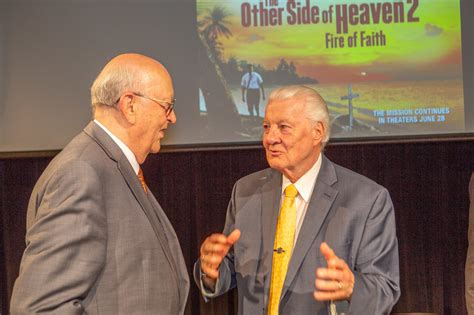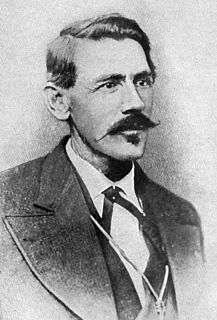A Quote by Elisabeth Elliot
All our problems are theological ones, William Temple said. All of them have to do with our relationship to God and his to us, and this is precisely why it makes sense to come to God with them.
Related Quotes
A personal relationship with God enhances life. First, it enables us to accept our limitations without being frustrated by them. It assures us that problems we can't solve are not necessarily insoluble. Second, when we need it, God offers us a sense of forgiveness, a sense of cleansing from our incompleteness. . . . Last and perhaps most important, a personal relationship with God redeems us from the fear of death. We needn't be afraid that all our good deeds will vanish when we die.
Why pray? Evidently, God likes to be asked. God certainly does not need our wisdom or our knowledge, nor even the information contained in our prayers ("your Father knows what you need before you ask him"). But by inviting us into the partnership of creation, God also invites us into relationship. God is love, said the apostle John. God does not merely have love or feel love. God is love and cannot not love. As such, God yearns for relationship with the creatures made in his image.
There are two gods. The god our teachers teach us about, and the God who teaches us. The god about whom people usually talk, and the God who talks to us. The god we learn to fear, and the God who speaks to us of mercy. The god who is somewhere up on high, and the God who is here in our daily lives. The god who demands punishment, and the God who forgives us our trespasses. The god who threatens us with the torments of Hell, and the God who shows us the true path.
There are two gods. A god who casts us off because of our sins, and a God who calls to us with His love.
Children, we may go to the temple, reverently circumambulate the sanctum sanctorum and put our offering in the charity box, but on our way out if we kick the beggar at the door, where is our devotion? Compassion towards the poor is our duty to God. Mother is not saying that we should give money to every beggar that sits in front of a temple, but do not despise them. Pray for them as well. When we hate others, it is our own mind that becomes impure. Equality of vision is God.
Why do we focus so intensely on our problems? What draws us to them? Why are they so attractive? They have the magnet power of love: somehow we desire our problems; we are in love with them much as we want to get rid of them . . . Problems sustain us -- maybe that's why they don't go away. What would a life be without them? Completely tranquilized and loveless . . . There is a secret love hiding in each problem
What then are we to do about our problems? We must learn to live with them until such time as God delivers us from them...we must pray for grace to endure them without murmuring. Problems patiently endured will work for our spiritual perfecting. They harm us only when we resist them or endure them unwillingly.
Our ability to fulfill any assignment is greatly enhanced when we understand the importance of the temple and pay close attention to all that is said and done there. The temple is for redeeming not only the dead but the living as well. All are alive in God, and He is no respecter of persons. Blessings always come from hearing and obeying His word, and His word is never more clear than in the temple.
In scripture we are told of some trusting in God and others trusting in idols, and that God is our refuge, our strength, our defense. In this sense God is the rock of his people, and false Gods are called the rock of those that trust in them. In the same sense the Gods of the King who shall do according to his will are called Mahuzzims, munitions, fortresses, protectors, guardians, or defenders.
No one will be offended if we tell them that they are good people who could be a little better. The offense comes when we tell them that they - and we - are ungodly people who cannot impress God or escape his tribunal. Until our preaching of the law has exposed our hearts and God's holiness at that profound level, our hearers will never flee to Christ alone for safety even if they come to us for advice.
There are no unique postures and times and limitations that restrict our access to God. My relationship with God is intimate and personal. The Christian does not go to the temple to worship. The Christian takes the temple with him or her. Jesus lifts us beyond the building and pays the human body the highest compliment by making it His dwelling place, the place where He meets with us. Even today He would overturn the tables of those who make it a marketplace for their own lust, greed and wealth.
Do we not see God at work in our circumstances? Dark times are allowed and come to us through the sovreignty of God. Are we prepared to let God do what He wants with us? Are we prepared to be separated from the outward, evident blessings of God? Until Jesus Christ is truly our Lord, we each have goals of our own which we serve. Our faith is real, but it is not yet permanent. And God is never in a hurry. If we are willing to wait, we will see God pointing out that we have been interested only in his blessings, instead of God Himself.
A woman once told me that she did not feel the need to reach out to those around her because she prayed every day. Surely, this was enough. But a prayer is about our relationship to God; a blessing is about our relationship to the spark of God in one another. God may not need our attention as badly as the person next to us on the bus or behind us in line in the supermarket. Everyone in the world matters, and so do their blessings. When we bless others, we offer them refuge from an indifferent world.


































